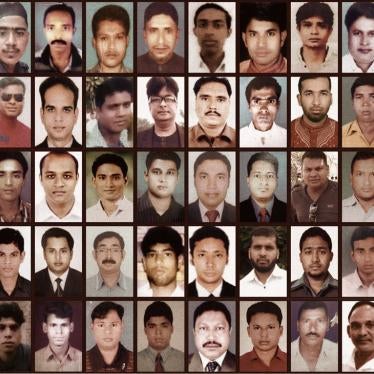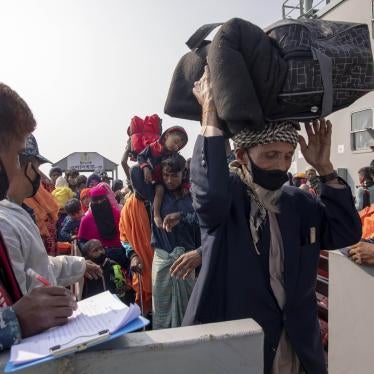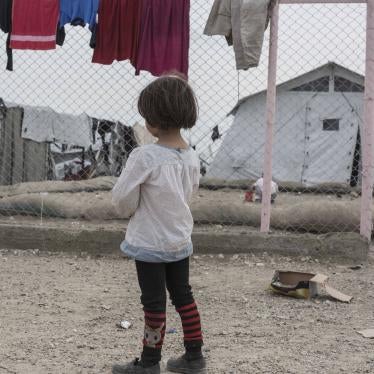September 4th, 2024
Re: Move Resolution at UNHRC to Investigate Bangladesh’s Deaths and Violence
Honourable Minister Joly,
We write this Open Letter to you as academics, lawyers, civil society leaders and organizations in Canada to seek your support for the urgent need to establish an independent international investigative mechanism under the auspices of the UN Human Rights Council, to investigate the unlawful killings, detention, torture and other serious human rights violations that have taken place in Bangladesh for decades and scaled up in recent months.
At least 600 people, including protesting students, bystanders, journalists and members of the security force, were killed in that country between July 16 and August 11, 2024. UNICEF reported 65 of those killed were children. This follows a peaceful student protest since July 1, 2024, against a discriminatory quota in the country’s government jobs. In response to the protest, the authorities unleashed a brutal crackdown, which resulted in a large number of unlawful killings by the security forces. As the wider population joined the protest demanding justice for the attacks against students, Bangladesh’s government deployed the armed forces, imposed a curfew and gave a shoot-on-sight order to its security forces.
Sheikh Hasina, who was prime minister of Bangladesh for 15 years until August 5, 2024, resigned and fled the country in the wake of the massive public uprising against her. Following her resignation, the country was left in a state of turmoil with killings, destruction of public and private properties and violence against Hindu and other minorities, and those perceived to be supporters of Awami League, Sheikh Hasina’s political party.
On August 8, 2024, interim administration was formed under the leadership of Nobel laureate Muhammad Yunus, who has the aspirations of many entrusted upon him to deliver justice and accountability. International support, including from key countries like Canada, will be essential.
Minister Joly, Bangladeshis, including within the community here in Canada, have been left traumatized by the lethal shots fired at students, who are in so many ways the lifeblood of the country.
The UN High Commissioner for Human Rights Volker Türk and mandate holders of the UN Special Procedures system have issued a number of statements raising alarms about the “large number of unlawful killings, possible enforced disappearances, torture and the detention of thousands of people.” The UN experts raised concerns about Bangladesh government’s poor human rights records, the lack of public trust in the judiciary and offered their assistance to “initiate a credible accountability process with the support of the United Nations.” A resolution at the UN Human Rights Council will strengthen the mandate and increase the scope and capacity of the UN-led investigation.
The accounts of horrific violence and unlawful action by security forces are grim. Video evidence verified by Amnesty International reveals that the police carried a student’s body on top of an armoured personnel carrier and dumped it on the road; the man was later confirmed dead. Nahid Islam, a Dhaka University student, one of the protest’s main organizers and now an adviser of the interim government, said he was picked up by security forces, tortured, and left unconscious on the street. The country’s police shot to death, Abu Sayeed, a student who bravely stood in front of them, stretching his arms wide open without posing any harm. No one should be able to get away with using unlawful force in any circumstances, including the audacity of doing so brazenly in broad daylight.
This is not the first time that a Bangladeshi government authorised unlawful killings. Human Rights Watch documented more than 350 unlawful killings by the country’s Rapid Action Battalion between March 2004 and December 2006 under the leadership of former Prime Minister Khaleda Zia. Nearly 2,600 people have been subjected to extrajudicial executions by security forces between 2009 and 2022 and 600 people were subjected to enforced disappearances under the leadership of former Prime Minister Sheikh Hasina.
Minister Joly, it would be a mistake to dismiss this situation in Bangladesh as the internal affairs of a sovereign country. This madness is the reflection of the cruel Pandora’s box for which some member states of the international community are responsible by consistently undermining vital international laws and mechanisms intended to rigorously prevent or respond to grave human rights violations.
An important step forward would be for Canada to press for the UN Human Rights Council to establish an independent international mechanism with a comprehensive mandate to investigate, collect, store, and analyse evidence and work with credible and independent national and international bodies towards accountability for these violations. Canada is well-placed to work with other countries, including within the Commonwealth, to demand that there be accountability for what transpired in Bangladesh – and it is vital to do so now, while the potential for a new path forward, grounded in human rights and justice, lies before the country and the international community.
The situation in Bangladesh is a test case for Canada’s clarion call for “seeking justice and accountability for those on the frontlines of defending human rights” – the first of six priorities that Canada outlined in support of its candidacy for the UN Human Rights Council’s 2028-2030 term.
Minister Joly, Bangladesh’s students have made the ultimate sacrifice for their human rights in recent months. In line with Canada’s commitment to seek justice and accountability, we urge you to:
- Immediately work with other states to move and garner support for a resolution to establish an independent international investigative mechanism at the UN Human Rights Council with a mandate to carry out an independent, impartial and thorough investigation into the unlawful killings, detention, torture, attack on minorities and other serious human rights violations that took place in Bangladesh for decades and scaled up in recent months.
- Encourage other countries, including within the Commonwealth, to demand that there be truth, justice, accountability and guarantees of non-recurrence for the grave human rights violations that have transpired in Bangladesh.
- Apply universal jurisdiction laws to ensure that individuals who are alleged to have committed or been responsible for serious human rights violations in Bangladesh do not evade justice and accountability in Canada.
- Call on the new administration led by Muhammad Yunus for an immediate release of all those detained solely for exercising their right to peaceful protest and to cooperate with all UN human rights bodies and experts, including the international mechanism, if and when it is established.
- Ensure that the Government of Canada’s bilateral and multilateral relations with Bangladesh are grounded in the restoration of peace, independence of the judiciary, and accountability for international human rights violations.
We look forward to your leadership in leveraging the momentum in Bangladesh in the interest of establishing global justice and accountability for a rules-based international order.
Sincerely,
Alex Neve, Senior Fellow, Graduate School of Public and International Affairs, University of Ottawa
Amnesty International Canada (English Speaking)
Amnistie internationale Canada francophone
Andrea Paras, Director, Guelph Institute of Development Studies, University of Guelph
Andrew Thompson, Adjunct Assistant Professor of Political Science, University of Waterloo
Anna Drake, Associate Professor, Department of Political Science, University of Waterloo
Ataharul Chowdhury, Associate Professor, School of Environmental Design and Rural Development, University of Guelph
Centre for Law and Democracy
Christopher Campbell-Duruflé, Lincoln Alexander School of Law, Toronto Metropolitan University
Craig Johnson, Professor of Political Science, University of Guelph
David Welch, University Research Chair and Professor, Department of Political Science, University of Waterloo
Dustin Ciufo, Assistant Professor, Department of Childhood and Youth Studies, King’s University College at Western University
Faisal Kutty, lawyer; Associate Professor of Law Emeritus, Valparaiso University; Affiliate Faculty Member at Rutgers Center for Security, Race and Rights
Heidi Matthews, Assistant Professor, Osgoode Hall Law School, York University
Human Rights Watch
IFEX
John Packer, Director, Human Rights Research and Education Centre, University of Ottawa
Justice for All Canada
Leilani Farha, Director, The Shift; former UN Special Rapporteur on the right to housing
Mark Kersten, Assistant Professor of Criminology & Criminal Justice, University of the Fraser Valley
Michael Lynk, Professor Emeritus, Western University; former UN Special Rapporteur for human rights in the occupied Palestinian territory
Monia Mazigh, Author, Adjunct Research Professor at the Department of English Language and Literature, Carleton University
Nirvana Mujtaba, Women’s Rights Policy and Advocacy Specialist, Oxfam Canada
Robert J. Currie, Viscount Bennett Professor of Law, Schulich School of Law, Dalhousie University
Saad Hammadi, Fellow, Balsillie School of International Affairs
Sabhanaz Rashid Diya, Senior Fellow, Centre for International Governance Innovation
Samya Hasan, Executive Director, Council of Agencies Serving South Asians (CASSA)
Sarah Beamish, human rights lawyer and founder, Beamish Law, Toronto
Sarah Teich, co-founder and president, Human Rights Action Group
Shannonbrooke Murphy, Endowed Chair and Associate Professor of Human Rights, St Thomas University
Shubhra Gururani, Director, York Centre for Asian Research








